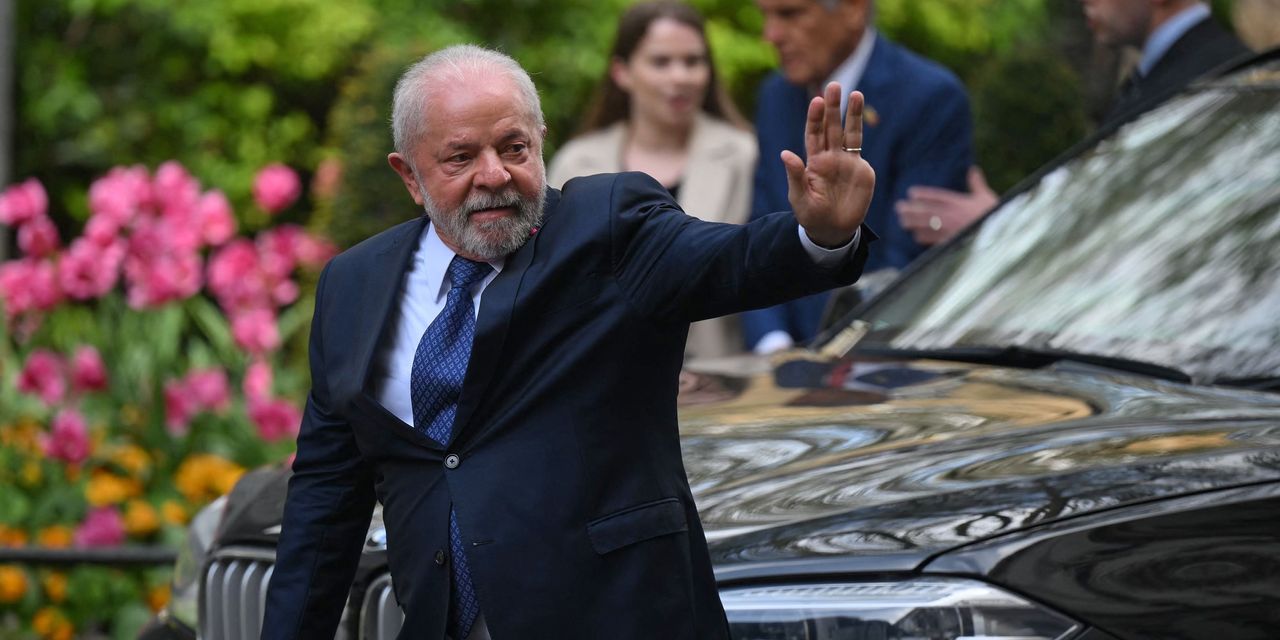Call it Lula’s-not-so-bad-after-all rally. Markets haven’t known what to make of Luiz Inácio Lula da Silva, the Brazilian president who stormed back to power last year after two terms in the 2000s.
Stocks crashed after his election in October, gyrated early this year, then went on a tear for the past two months. The
iShares MSCI Brazil
exchange-traded fund (ticker: EWZ) is up 17% from a late-March low. Brazil’s currency, the real, has gained 7% against the dollar.
The catalyst for this upturn is a “fiscal framework” that the 77-year-old leader presented to Congress in April. It earns a solid B from investors, better than expected after the left-leaning Lula ditched a previous spending cap.
The framework ties government spending increases to revenue increases, and promises a primary budget surplus (excluding debt payments) by 2025. That wouldn’t be enough to dig Brazil out of its 75%-of-gross-domestic-product debt hole, but it points in the right direction. “The framework isn’t perfect, but it’s not extreme,” says Alejandro di Bernardo, an emerging-market debt investment manager at Jupiter Asset Management.
With fiscal extremity off the table, there’s a lot to like about Brazilian securities. They are still cheap, despite the recent run-up. Stocks trade at an average of seven times earnings, compared with 12 for Mexican shares, says Malcolm Dorson, portfolio manager at Global X.
Brazil led the world in interest rate hikes to quell postpandemic inflation. It worked. The prime rate sits at 13.75%, while April inflation came in at 4.2% annually. That offers an almost irresistible “carry” to fixed-income investors.
Equities are being buoyed by the promise of rate cuts, which would energize consumer spending and corporate profits. The central bank will start mulling these once the fiscal framework is signed and sealed by Congress next month, says Pablo Riveroll, head of Latin American equities at Schroders. Market consensus expects an easing to 12.5% by the end of this year and 10% by December 2024, he says.
Easier money should juice domestic-facing stocks from Localiza Rent a Car (RENT3.Brazil) to shopping mall operator Multiplan Empreendimentos Imobiliários (MULT3.Brazil).
Banks are also well-positioned, adds Verena Wachnitz, a portfolio manager for Latin American equities at T. Rowe Price. Falling rates mean less strain on borrowers and improved asset quality, more than compensating for any loss on interest spreads.
Prices are attractive, too. Leading commercial bank
Itau Unibanco Holding
(ITUB) is valued at 1.5 times book value, compared with 1.8 for Mexican peer
Grupo Financiero Banorte
(GFNORTEO.Mexico). “This is the right time of the cycle to buy banks,” Wachnitz says.
Dorson is playing the expected Brazilian recovery with some higher-beta stocks as well, like budget airline
Azul
(AZUL) and
Nu Holdings
(NU), parent of fintech star Nubank. Nu shares have rebounded 75% this year after a calamitous 2022.
This being Brazil, there’s plenty to worry about longer term. Lula appointees will have control of the central bank by January 2025, threatening a bulwark of economic orthodoxy.
Even under the fiscal framework, the national debt would grow by 2.5% to 3% of GDP a year, calculates Ricardo Adrogue, head of global sovereign debt and currencies at Barings. Lula’s administration is already end-running the framework with a rapid increase in subsidized loans from the Brazilian Development Bank, he says. So, “we have significantly reduced our investments in Brazil,” he adds.
The carnival might continue for a while longer, however.
Email: [email protected]
Read the full article here


